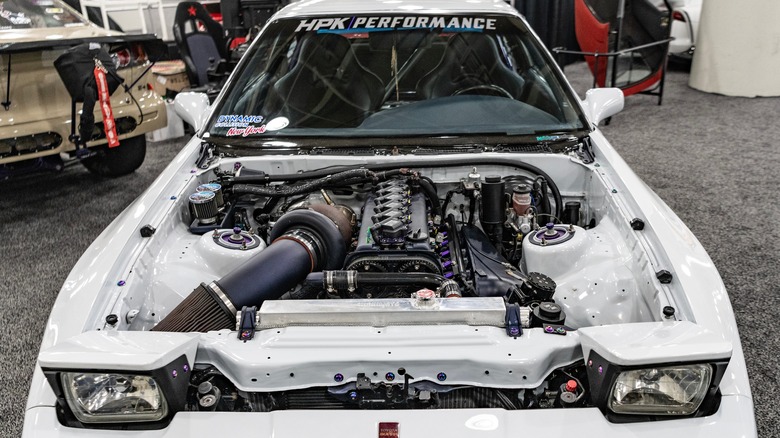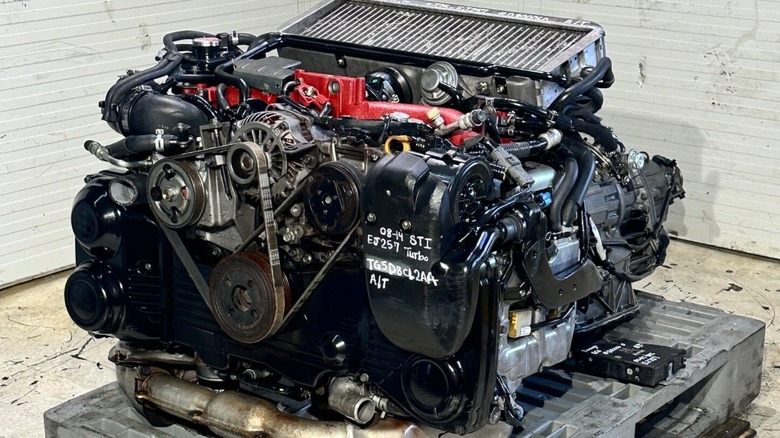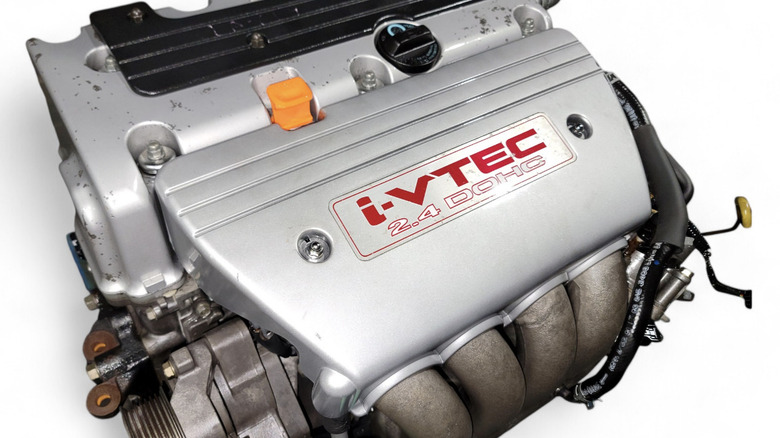What Exactly Is A JDM Engine & Are They Legal To Use In The United States?
If you're involved in the car scene at all, you've probably heard the term "JDM" or "JDM engine" at one point or another. But what exactly does it mean? First of all, JDM stands for "Japanese domestic market." The term technically refers to any vehicle built and sold exclusively for Japanese customers living inside the country. However, these days, most people use JDM to refer to any car with Japanese origins, and it's especially common to hear JDM used to describe sports cars and high-performance vehicles. Today, some of the most famous and beloved JDM cars include models like the Subaru Impreza, Honda Civic, and the iconic Nissan Skyline GT-R.
However, considering that we can use JDM to refer to basically any car built by a Japanese brand, it can be confusing to differentiate between a regular U.S.-Honda and the JDM version. Furthermore, it's not always legal to drive vehicles from other countries inside the United States. So, enthusiasts hoping to import a true JDM engine or car into the U.S. may be curious if it's legal to do so.
Fortunately, here at SlashGear, we can help. As a former professional auto mechanic, a lifelong gearhead, and a huge fan of Japanese cars, I'll break it down. We'll explain how to know whether or not any given JDM engine is legal in the United States, how to get a true JDM engine imported, and whether or not you can use one in your car. Let's dive in and check it out.
Are JDM engines legal in the United States?
Broadly speaking, JDM engines are legal in the United States. However, that statement fails to take a couple of factors into consideration. First of all, remember that many people use JDM to refer to vehicles that are already legal in the U.S. — in many cases, these vehicles are even built within the country's borders. However, JDM technically refers to cars built exclusively for the Japanese market. With this distinction, from this point on, we'll be using the term JDM to refer specifically to cars and parts built in Japan for Japanese customers.
Now, using those parameters, are JDM engines legal in the United States? Again, it's a tricky question to answer because every engine is different. The most straightforward answer is that yes, JDM engines are legal in the United States as long as they meet current Environmental Protection Agency (EPA) guidelines. These guidelines were first put into place in the mid 1970s to combat growing smog levels across major U.S. cities. Since then, the laws have evolved to encompass more restrictions, adding things like a catalytic converter requirement for all passenger vehicles and modern emissions control systems. Thanks to these laws, our cars are more eco-friendly than ever before. However, they do place certain limitations on us and the types of vehicles we can drive, which leads us back to JDM engines.
Due to the EPA guidelines, it's important to find the right dealer or importer when shopping for a JDM engine or part. Otherwise, you may get your hands on an illegal engine. Then, you'll have to modify it yourself to make it legal or risk dealing with law enforcement.
How to get a JDM engine in the U.S.
If you're trying to get a JDM engine in the United States, there are a couple of things you need to know. First things first, you need to find a reputable dealer or importer. If you're already in the car scene, you should ask around to find out if anyone you know has a connection. You might be surprised to learn that someone you know specializes in importing JDM cars or parts. Otherwise, you should look around online for importers and vendors that specialize in Japanese cars and auto parts. Read reviews and testimonies left by previous customers, ask about whether or not their engines meet EPA guidelines, and inquire about any warranties or guarantees.
There are a lot of solid places to buy JDM car parts online. Just remember to do your research. Importing a part from a distant country isn't like ordering something off Amazon. If you make a mistake and order the incorrect model or buy a dud, you could be out thousands of dollars, and it could be extremely difficult to get your money back — if you're able to get it back at all. That's why it's so critical that you do your homework. It may sound repetitive, but when large sums of money are involved, it's worth repeating yourself once or twice to make sure you make the right purchase the first time.
Can you put a JDM engine into any car?
Lots of people are interested in buying a JDM engine to put into their Japanese-branded (but U.S.-made) car. K-swapping, for example, is very common and means putting a Honda K-series engine into a car that didn't come with one. The Honda K24 engine is a highly popular choice for this type of mod, and many people seek out JDM K-series engines, in part, due to the fact that Japanese motors typically have extremely low mileage.
However, other people may be interested in dropping a JDM engine into an American muscle car frame or a sleek German sports car body. In that case, you may be curious if it's possible to do so. In theory, you can put virtually any engine into any vehicle — provided it fits, of course. However, the problems arise when you try to match up different pieces of equipment.
For example, you might be able to fit a JDM motor into your classic muscle car's engine bay, but the stock transmission probably won't work with the new engine. That means you may need to modify various parts of the vehicle to make the engine work. Some cars might require a whole new drivetrain, while others will accept a JDM engine with little-to-no necessary modifications, meaning research is key here, too. If you want to swap a JDM engine into your car, you'll need to do your homework. The last thing you need is to get half-way into your project only to realize you need a new transmission and a rebuilt rear end.



